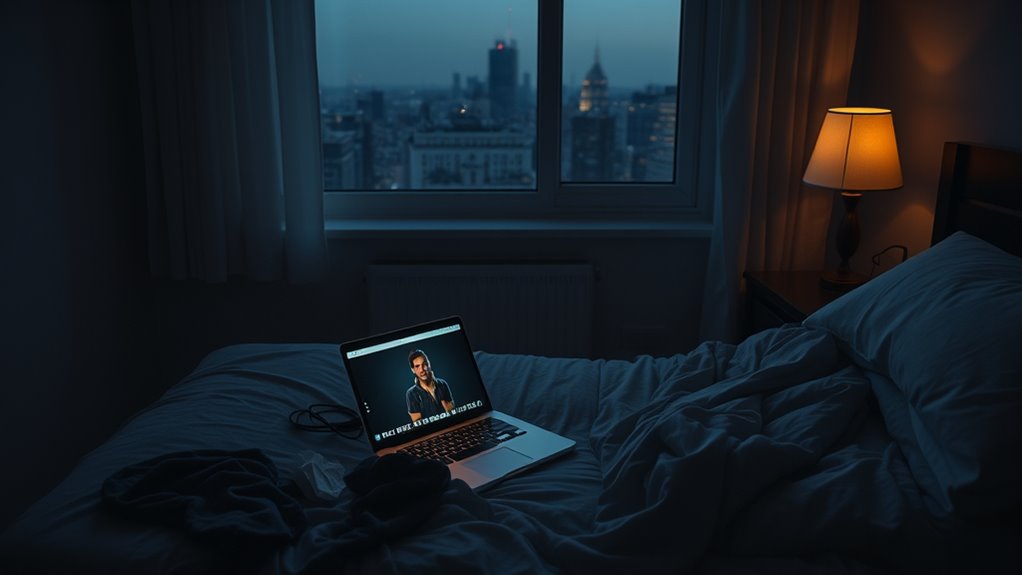The pandemic’s lockdowns increased feelings of isolation and stress, leading many people to rely more on sex and pornography for comfort. This reliance sometimes worsened existing addictions or triggered new compulsive habits. Increased access online and emotional struggles made resisting these behaviors harder. If you’ve noticed changes in your habits or feel overwhelmed, there’s more to understand about how these patterns can escalate and ways to manage them effectively.
Key Takeaways
- Increased isolation and stress during the pandemic led to higher reliance on sex and porn for escapism.
- Lockdowns’ disruption of routines heightened secretive or compulsive sexual behaviors.
- Frequent exposure to online porn during restrictions can cause desensitization and escalation of use.
- Post-lockdown, some individuals may experience continued or worsened addictive patterns due to dependency.
- Recognizing problematic behaviors is vital, as pandemic-related stress can exacerbate sex and porn addictions.

The pandemic and subsequent lockdowns have markedly altered daily routines, prompting many to seek comfort and escape through increased sexual activity or exposure to pornography. With more time spent alone or in confined spaces, you might have noticed a rise in your own urges or behaviors. The sudden shift in your environment, combined with heightened stress and uncertainty, can make it tempting to turn to sex or porn as a way to cope. For some, this leads to more frequent masturbation, secretive viewing habits, or even compulsive behaviors that start to interfere with daily life. It’s important to recognize that these behaviors aren’t inherently problematic; they’re often a natural response to difficult circumstances. However, for others, what begins as occasional use can spiral into an addiction when it becomes a primary way to manage emotions or fill a void.
Many people found themselves turning to pornography as a form of escapism, especially when physical intimacy with partners was limited or impossible. The accessibility of online content made it easy to indulge multiple times a day without judgment or repercussions. Over time, this increased exposure can lead to a desensitization, where normal sexual experiences no longer provide satisfaction, prompting even more extreme or frequent consumption. If you felt a loss of control or noticed that your porn viewing habits were interfering with your work, relationships, or overall well-being, it could be a sign that your habits have crossed into problematic territory. The pandemic’s isolation might have also heightened feelings of loneliness, making you more prone to seeking solace in online sexual content or compulsive behaviors. Additionally, the role of technology in facilitating easy access to these materials has contributed significantly to the intensification of these issues.
Another factor that exacerbates these issues is the lack of social outlets. With bars, clubs, and social gatherings shut down, many turned inward, relying on their own devices for stimulation and comfort. This can reinforce addictive patterns, especially if you use sex or porn as a way to numb negative emotions like anxiety, depression, or boredom. The key is to be honest with yourself about how these behaviors affect your life. If you find yourself compulsively seeking out sex or porn, neglecting responsibilities, or feeling shame afterward, it’s a sign that the habits may have become problematic. Recognizing these signs is the first step toward seeking help or implementing healthier coping strategies. Remember, you’re not alone in this, and support is available if you need it.
Frequently Asked Questions
How Can I Identify if I Have a Sex or Porn Addiction?
If you’re wondering whether you have a sex or porn addiction, pay attention to your behaviors. Do you find yourself unable to control urges, neglecting responsibilities, or feeling guilt afterward? You might also notice spending excessive time or money on these activities. If these signs resonate, consider seeking help from a mental health professional who can provide guidance and support tailored to your situation.
Are There Effective Treatments for Pandemic-Related Increases in Addiction?
You can find effective treatments for pandemic-related addiction increases by seeking professional help. Therapies like cognitive-behavioral therapy (CBT) and support groups offer valuable strategies to manage urges and underlying issues. Medication might also be recommended in some cases. It is crucial to reach out to mental health experts who can tailor a treatment plan specific to your needs, helping you regain control and build healthier habits.
What Long-Term Effects Might Pandemic-Induced Addictions Have?
Imagine a fragile glass vase, cracked yet held together—this is how pandemic-induced addictions might affect you long-term. You could find yourself trapped in a cycle, where cravings chip away at your stability, impacting relationships, work, and mental health. Without intervention, these habits may deepen, making recovery harder over time. Recognizing the signs early helps you rebuild and protect your well-being, preventing lasting damage.
Can Online Support Groups Help During Recovery From Addiction?
Online support groups can be a real help during your recovery from addiction. They provide a safe space where you can share your experiences, gain encouragement, and get advice from others who understand what you’re going through. By connecting with people facing similar struggles, you can stay motivated and accountable. These virtual communities make support accessible whenever you need it, helping you stay on track and build healthier habits.
Is There a Link Between Mental Health Issues and Increased Addiction During Lockdowns?
You might notice that mental health issues like anxiety or depression can lead you to increase addictive behaviors during lockdowns. When you’re feeling isolated or overwhelmed, it’s common to turn to sex or porn as a coping mechanism. Recognizing this link helps you understand your triggers better, so you can seek healthier strategies and support, ultimately reducing the risk of worsening addictions during stressful times.
Conclusion
As the pandemic’s shadow lifts, you might feel like a lighthouse emerging from fog—bright but uncertain. The lockdown’s storm may have deepened your cravings, turning your mind into a turbulent sea. But remember, even in chaos, there’s a steady beacon within you waiting to guide you back to calmer waters. With awareness and support, you can navigate these currents, steering toward a brighter horizon where healing and balance shine like dawn breaking through night.









